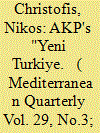|
|
|
Sort Order |
|
|
|
Items / Page
|
|
|
|
|
|
|
| Srl | Item |
| 1 |
ID:
162008


|
|
|
|
|
| Summary/Abstract |
The essay shows how Turkey's Justice and Development Party (AKP) and, most importantly, the country's president, Recep Tayyip Erdogan, use the concept of Yeni Turkiye (New Turkey) in attempts to construct a new national state tradition, a counterhegemonic narrative to replace Turkey's traditional one, Kemalism. It is argued that the AKP aims to replace Kemalism to reconstruct the imagined Turkish community anew. It is further argued that collective memory is central to AKP discourses and repertoires in the party's attempt to construct stabilized, sedimented, dominant, and durable features in this renewed process of Turkish national-identity formation and nation building.
|
|
|
|
|
|
|
|
|
|
|
|
|
|
|
|
| 2 |
ID:
162009


|
|
|
|
|
| Summary/Abstract |
This essay explores the evolution of the constitutional debate in Turkey during the 2009–11 period in terms of political parties' strategies. It provides analytical insight via quantitative text analysis into party positions based on the four major parties' proposed constitutional drafts in 2013. The analyses reveal a path from the employment of heresthetics to hegemonic, single-party dominance: the dominant party employed the constitutional debate to manipulate the ethnic dimension by engaging in heresthetics while various political party constellations were also in play.
|
|
|
|
|
|
|
|
|
|
|
|
|
|
|
|
| 3 |
ID:
162012


|
|
|
|
|
| Summary/Abstract |
Turkey has suffered through a process of autocratization in the second decade of the twenty-first century. The political turn from a defective democracy toward a competitive authoritarian state is part of the concentration and personalization of political power in the person of Recep Tayyip Erdogan and illustrates the influence of political institutions. This situation has given rise to a "dual presidentialization," meaning a situation that has arisen from institutional changes and certain informal factors. The hypothesis is that this dual presidentialization has accelerated Turkey's movement toward autocracy via several dimensions: a greater control over the judicial branch and over public freedoms, in general, and freedom of the press, in particular.
|
|
|
|
|
|
|
|
|
|
|
|
|
|
|
|
| 4 |
ID:
162013


|
|
|
|
|
| Summary/Abstract |
In 1993, Piotr Sztompka stated that some post-Soviet societies were doomed to suffer from "civilizational incompetence." The key argument was that the vision of a golden past acts as a deterrence mechanism against the future. Modernization is resisted not because of its dangers but because there is an idealized (and ultimately utopic) past to which societies aim to return. Naturally, it is impossible to return to a state of affairs in which the current sociopolitical environment did not exist. The current essay attempts to prove the need for and utility of looking to the concept of civilizational incompetence to read Turkish contemporary affairs. In that regard, the hybridization of Recep Tayyip Erdogan's regime, which strengthens republican power at the same time as it captures and instrumentalizes Ottoman glamour, can be perceived as a symptom of civilizational incompetence.
|
|
|
|
|
|
|
|
|
|
|
|
|
|
|
|
| 5 |
ID:
162007


|
|
|
| 6 |
ID:
162011


|
|
|
|
|
| Summary/Abstract |
The relationship between Turkish media conglomerates and the Justice and Development Party (AKP) government has shown increased conflict since 2009. The AKP, under the leadership of Recep Tayyip Erdogan, has displayed increasing fear of and suspicion toward Turkey's liberal media. Censorship of the news in Turkey intensified after the failed coup attempt of July 2016. Media control tools used by business moguls were supported by the government and led the way to the creation of a corporatist media, which in turn has come under increased government pressure. This essay also highlights an ever-present tension within media and politics in Turkey. Turkish journalists tend to define themselves as liberals who historically assigned themselves the mission to inform the public and to raise public awareness on political issues independent of ruling governments. In contrast, successive Turkish governments, both conservative and liberal, have tended to view the media either as an ally or as an enemy to be feared.
|
|
|
|
|
|
|
|
|
|
|
|
|
|
|
|
| 7 |
ID:
162006


|
|
|
| 8 |
ID:
162010


|
|
|
|
|
| Summary/Abstract |
The Gezi uprising can be considered a crucial turning in Turkish politics. As a response to countrywide democratic protests, the Justice and Development Party (AKP) government revived the security state, escalated authoritarian tendencies, and started to organize a nationalist, Islamist, and conservative backlash. This essay argues that the Gezi Park protests revealed both the fragility of the AKP's hegemony and the limits of the dominant political group habitus, which were promoted by the party to consolidate political polarization in favor of the party's hegemony. Moreover, it is argued that the Gezi uprising transformed the culture of political protests in the country and paved the way for the emergence of affirmative resistance, radical imagination, and a new politics of desire and dignity against authoritarian and neoliberal policies.
|
|
|
|
|
|
|
|
|
|
|
|
|
|
|
|
|
|
|
|
|